动词的时态和语态
- 格式:doc
- 大小:97.50 KB
- 文档页数:15
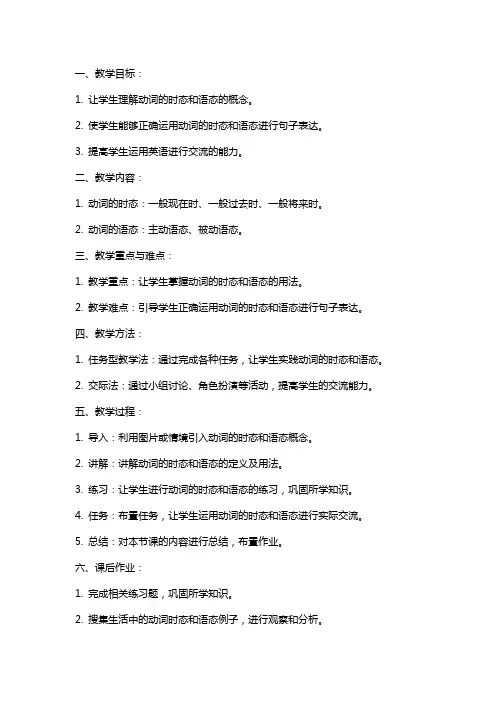
一、教学目标:1. 让学生理解动词的时态和语态的概念。
2. 使学生能够正确运用动词的时态和语态进行句子表达。
3. 提高学生运用英语进行交流的能力。
二、教学内容:1. 动词的时态:一般现在时、一般过去时、一般将来时。
2. 动词的语态:主动语态、被动语态。
三、教学重点与难点:1. 教学重点:让学生掌握动词的时态和语态的用法。
2. 教学难点:引导学生正确运用动词的时态和语态进行句子表达。
四、教学方法:1. 任务型教学法:通过完成各种任务,让学生实践动词的时态和语态。
2. 交际法:通过小组讨论、角色扮演等活动,提高学生的交流能力。
五、教学过程:1. 导入:利用图片或情境引入动词的时态和语态概念。
2. 讲解:讲解动词的时态和语态的定义及用法。
3. 练习:让学生进行动词的时态和语态的练习,巩固所学知识。
4. 任务:布置任务,让学生运用动词的时态和语态进行实际交流。
5. 总结:对本节课的内容进行总结,布置作业。
六、课后作业:1. 完成相关练习题,巩固所学知识。
2. 搜集生活中的动词时态和语态例子,进行观察和分析。
七、评价方式:1. 课堂表现:参与度、回答问题准确性等。
2. 练习完成情况:作业、练习题的正确性。
3. 任务完成情况:小组活动、角色扮演的表现。
八、教学拓展:1. 对比分析不同动词时态和语态的用法。
2. 引导学生运用动词的时态和语态创作小故事或对话。
九、教学反思:1. 总结本节课的优点和不足。
2. 根据学生的反馈调整教学方法和策略。
十、课程资源:1. 教材:英语课本、辅导书等。
2. 网络资源:相关教学视频、课件、练习题等。
六、教学评价:1. 课堂参与度:观察学生在课堂上的活跃程度和参与度,包括提问、回答问题、小组讨论等。
2. 知识掌握情况:通过课堂练习和课后作业,评估学生对动词时态和语态的理解和运用能力。
3. 交流能力:评估学生在小组活动和角色扮演中运用英语进行交流的能力。
七、教学拓展:1. 对比分析:让学生对比分析不同动词时态和语态在实际语境中的运用差异。
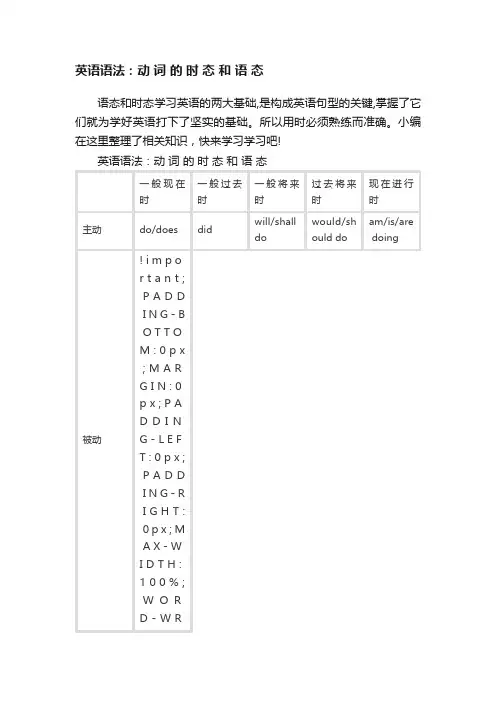
英语语法:动词的时态和语态语态和时态学习英语的两大基础,是构成英语句型的关键,掌握了它们就为学好英语打下了坚实的基础。
所以用时必须熟练而准确。
小编在这里整理了相关知识,快来学习学习吧!英语语法:动词的时态和语态一般现在时一般过去时一般将来时过去将来时现在进行时主动do/does did will/shalldowould/should doam/is/aredoing被动! i m p o r t a n t ; P A D D I N G - B O T T O M : 0 p x ; M A R G I N : 0 p x ; P A D D I N G - L E F T : 0 p x ; P A D D I N G - RI G H T :0 p x ; MA X - WI D T H :1 0 0 % ; W O R D - W Re a k - w o r d ! i m p o r t a n t ; F O N T - SI Z E : 15 p x ; PA D D I N G - T O P : 0 p x " b d sf i d = "1 0 9 " >a m / i s / a r e d o n e / s p a n > / t d > t d s t y l e = "b o x - s i z i n g : b o r d e r - b o x ; b o r d e r - b o t t o m - s t y l e : s o l i d ; b o r d e r -c o l o2 2 1 , 2 2 1 , 2 21 ) ; b o rd e r - le f t - s t y l e : i n i t i a l ; p a d d i n g : 5 p x 1 0 p x ; m a r g i n : 0 p x ; m a x - w i d t h : 1 0 0 % ; w o r d - b r e a k : b r e a k - a l l ; b o r d e r - t o p - s t y l e : i n i t i a l ;b o r d e r - r i g h t - s t y l e : s o l i d ; w o r d - w r a p : b ro r d ! i m p o r t a n t ; " w i d t h = " 7 2 "b d s f id = " 1 10 " > s pa n s t y l e = " B O X - S I Z I N G :b o r d e r - b o x ! i m p o r t a n t ; P A D D I N G - B O T T O M : 0 p x ; M A R G I N : 0 p x ; P A D D I N G - L E F T : 0 p x ; P A D D I N G - RI G H T :0 p x ; MA X - W1 0 0 % ; W O R D - W R A P : b r e a k - w o r d ! i m p o r t a n t ; F O N T - SI Z E : 15 p x ; PA D D I N G - T O P : 0 p x " b d sf i d = "1 1 1 " > w a s / w e r e d o n e / s p a n > / t d > t d s t y l e = " b o x - s i z i n g : b o r d e r - b o x ; b o r d e r - b o t t o m - s to l i d ; b o r d e r - c o l o r : r g b ( 2 2 1 , 2 2 1 , 2 21 ) ; b o rd e r - le f t - s t y l e : i n i t i a l ; p a d d i n g : 5 p x 1 0 p x ; m a r g i n : 0 p x ; m a x - w i d t h : 1 0 0 % ; w o r d - b r e a k : b r e a k - a l l ; b o r d e r - t o p - s t y l e : i n i t i a l ;b o r d e r - r i g h t - s t yi d ; w o r d - w r a p : b r e a k - w o r d ! i m p o r t a n t ; " w i d t h = " 7 2 "b d s f id = " 1 12 " > s pa n s t y l e = " B O X - S I Z I N G :b o r d e r - b o x ! i m p o r t a n t ; P A D D I N G - B O T T O M : 0 p x ; M A R G I N : 0 p x ; P A D D I N G - L E F T : 0 p x ; P A D DI G H T :0 p x ; MA X - WI D T H :1 0 0 % ; W O R D - W R A P : b r e a k - w o r d ! i m p o r t a n t ; F O N T - SI Z E : 15 p x ; PA D D I N G - T O P : 0 p x " b d sf i d = "1 1 3 " > w i l l / s h a l l b e d o n e / s p a n > / t d > t d s t y l e = " b o x - s i z i n g : b o r d e rb o r d e r - b o t t o m - s t y l e : s o l i d ;b o r d e r -c o l o r : r g b ( 2 2 1 , 2 2 1 , 2 2 1 ) ; b o rde r - l ef t - s t y l e : i n i t i a l ; p a dd i n g :5 p x 1 0 p x ; m a r g i n :0 p x ; ma x - w id t h : 10 0 % ; w o r d - b r e a k : b r e a k - a l l ; b o r d e r - t o p - s t y l e :l ; b o r d e r - r i g h t - s t y l e : s o l i d ; w o r d - w r a p : b r e a k - w o r d !i m p o r t a n t ; " w i d t h = " 7 2 " b d s fi d = " 11 4 " > s p a n s t y l e = "B O X - S I Z I N G : b o r d e r - b o x ! i m p o r t a n t ; P A D D I N G - B O T T O M :0 p x ; MA R G I N : 0 p xD I N G - LEF T :0 p x ; PA D D I N G - R I G H T : 0 p x ; M A X - W ID T H : 10 0 % ; W O R D - W R A P : b r e a k - w o r d ! i m p o r t a n t ; F O N T - S I Z E : 1 5 p x ; P A D D I N G - T O P : 0 p x "b d s f id = " 1 15 " > w o u l d / s h o u l d b e d o n e / s p a n > / tt y l e = " b o x - s i z i n g : b o r d e r - b o x ; b o r d e r - b o t t o m - s t y l e : s o l i d ; b o r d e r - c o l o r : rg b ( 2 21 ,2 2 1 , 2 2 1 ) ;b o r d e r - l e f t - s t y l e : i n i t i a l ; p a d d i n g : 5 p x 10 p x ; ma r g i n : 0 p x ; m a x - wi d t h :1 0 0 % ; w o r d - b r e a kk - a l l ;b o r d e r - t o p - s t y l e : i n i t i a l ; b o r d e r - r i g h t - s t y l e : s o l i d ; w o r d - w r a p : b r e a k - w o r d ! i m p o r t a n t ; " w i d t h = " 7 2 " b d s fi d = " 11 6 " > s p a n s t y l e = "B O X - S I Z I N G : b o r d e r - b o x ! i m p o r t a n t ; P A D D I NT O M :0 p x ; MA R G I N : 0 p x ; P A D D I N G - L E F T :0 p x ; PA D D I N G - R I G H T : 0 p x ; M A X - W ID T H : 10 0 % ; W O R D - W R A P : b r e a k - w o r d ! i m p o r t a n t ; F O N T - S I Z E : 1 5 p x ; P A D D I N G - T O P : 0 p x "b d s f id = " 1 17 " > aa r eb e i n g d o n e / s p a n > / t d > / t r > t r h e i g h t = " 3 4 " s t y l e = " B O X - S I Z I N G : b o r d e r - b o x ; P A D D I N G - B O T T O M :0 p x ; MA R G I N : 0 p x ; P A D D I N G - L E F T :0 p x ; PA D D I N G - R I G H T : 0 p x ; M A X - W ID T H : 10 0 % ;- W R A P : b r e a k - w o r d ! i m p o r t a n t ; H EI G H T :3 4 p x ; P A D D I N G - T O P : 0 p x " b d sf i d = "1 1 8 " > t d h e ig h t = "3 4 " s t y l e = "b o x - s i z i n g : b o r d e r - b o x ; b o r d e r - b o t t o m - s t y l e : s o l i d ;b o r d e r -c o l o r : r g b ( 2 2 1 ,2 1 ) ; b o r d e r - l e f t - s t y l e : s o l i d ; p a d d i n g : 5 p x 1 0 p x ; m a r g i n : 0 p x ; m a x - w i d t h : 1 0 0 % ; w o r d - b r e a k : b r e a k - a l l ; b o r d e r - t o p - s t y l e : i n i t i a l ;b o r d e r - r i g h t - s t y l e : s o l i d ; w o r d - w r a p : b r e a k - w o r d ! ia n t ; " w i d t h = " 7 2 "b d s f id = " 1 19 " > & n b s p ; / t d > t d s t y l e = " b o x - s i z i n g : b o r d e r - b o x ; b o r d e r - b o t t o m - s t y l e : s o l i d ; b o r d e r - c o l o r : r g b ( 2 2 1 , 2 2 1 , 2 21 ) ; b o rd e r - le f t - s t y l e : i n i t i a l ; p a d d i n g : 5 p; m a r g i n : 0 p x ; m a x - w i d t h : 1 0 0 % ; w o r d - b r e a k : b r e a k - a l l ; b o r d e r - t o p - s t y l e : i n i t i a l ;b o r d e r - r i g h t - s t y l e : s o l i d ; w o r d - w r a p : b r e a k - w o r d ! i m p o r t a n t ; " w i d t h = " 7 2 "b d s f id = " 1 20 " >。
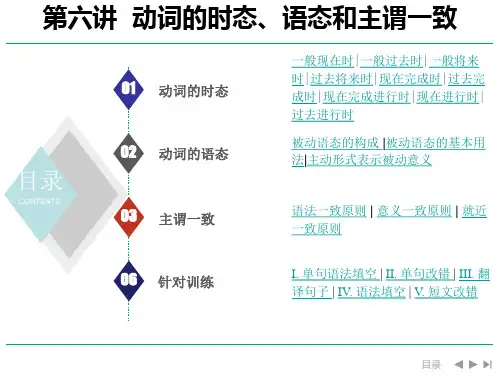
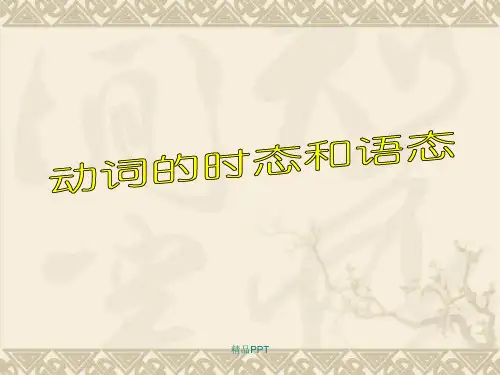
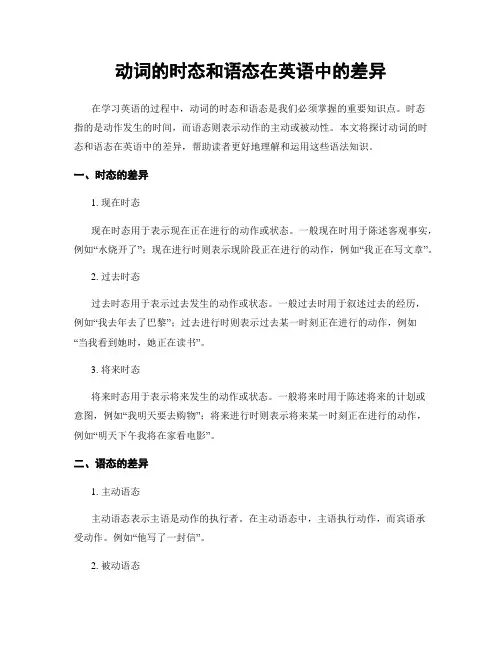
动词的时态和语态在英语中的差异在学习英语的过程中,动词的时态和语态是我们必须掌握的重要知识点。
时态指的是动作发生的时间,而语态则表示动作的主动或被动性。
本文将探讨动词的时态和语态在英语中的差异,帮助读者更好地理解和运用这些语法知识。
一、时态的差异1. 现在时态现在时态用于表示现在正在进行的动作或状态。
一般现在时用于陈述客观事实,例如“水烧开了”;现在进行时则表示现阶段正在进行的动作,例如“我正在写文章”。
2. 过去时态过去时态用于表示过去发生的动作或状态。
一般过去时用于叙述过去的经历,例如“我去年去了巴黎”;过去进行时则表示过去某一时刻正在进行的动作,例如“当我看到她时,她正在读书”。
3. 将来时态将来时态用于表示将来发生的动作或状态。
一般将来时用于陈述将来的计划或意图,例如“我明天要去购物”;将来进行时则表示将来某一时刻正在进行的动作,例如“明天下午我将在家看电影”。
二、语态的差异1. 主动语态主动语态表示主语是动作的执行者。
在主动语态中,主语执行动作,而宾语承受动作。
例如“他写了一封信”。
2. 被动语态被动语态表示主语是动作的承受者。
在被动语态中,宾语成为动作的执行者,而主语承受动作。
例如“一封信被他写了”。
三、时态和语态的综合运用时态和语态在英语中的差异并不是孤立存在的,它们常常结合起来使用,以表达更加精确的意思。
1. 现在完成时态现在完成时态用于表示过去发生的动作对现在造成的影响或结果。
它由助动词“have/has”和动词的过去分词构成。
例如“我已经吃过晚饭了”表示过去发生的动作对现在的状态产生了影响。
2. 过去完成时态过去完成时态用于表示过去某个时间点之前已经完成的动作。
它由助动词“had”和动词的过去分词构成。
例如“他们已经离开了,当我到达时”。
3. 将来完成时态将来完成时态用于表示将来某个时间点之前已经完成的动作。
它由助动词“will have”和动词的过去分词构成。
例如“明天下午他们将已经离开”。
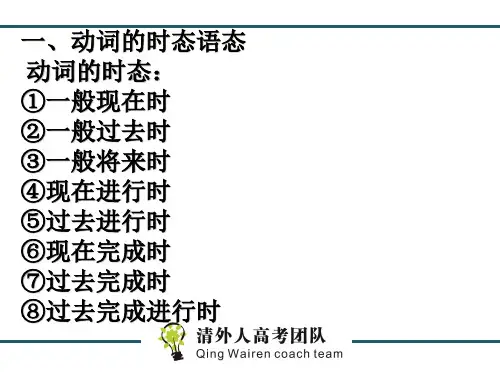
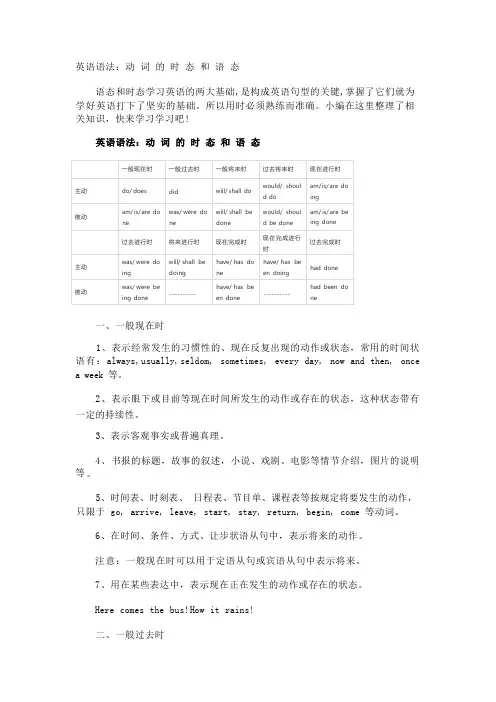
英语语法:动词的时态和语态语态和时态学习英语的两大基础,是构成英语句型的关键,掌握了它们就为学好英语打下了坚实的基础。
所以用时必须熟练而准确。
小编在这里整理了相关知识,快来学习学习吧!一、一般现在时1、表示经常发生的习惯性的、现在反复出现的动作或状态,常用的时间状语有:always,usually,seldom, sometimes, every day, now and then, once a week 等。
2、表示眼下或目前等现在时间所发生的动作或存在的状态,这种状态带有一定的持续性。
3、表示客观事实或普遍真理。
4、书报的标题,故事的叙述,小说、戏剧、电影等情节介绍,图片的说明。
5、时间表、时刻表、日程表、节目单、课程表等按规定将要发生的动作,只限于 go, arrive, leave, start, stay, return, begin, come 等动词。
6、在时间、条件、方式、让步状语从句中,表示将来的动作。
注意:一般现在时可以用于定语从句或宾语从句中表示将来。
7、用在某些表达中,表示现在正在发生的动作或存在的状态。
Here comes the bus!How it rains!二、一般过去时等1、表示在过去某一时间点发生的动作或所处的状态,与现在没有关系。
常用的时间状语有:yesterday, last night, at that time 等。
2、表示在过去某一段时间里反复出现的动作或状态,与现在没有关系。
3、用 used to do 或would do 表示过去经常或反复发生的动作。
4、有些情况发生的时间没清楚表明,但实际上是“刚才,刚刚”发生的,属于过去时间,应使用过去时态。
常见的有 I didn’t know…或 I forgot…等。
5、一般过去时可与 today, this week, this month 等时间状语连用。
三、一般将来时1、will/shall do(1)表示将来会出现的动作或状态。
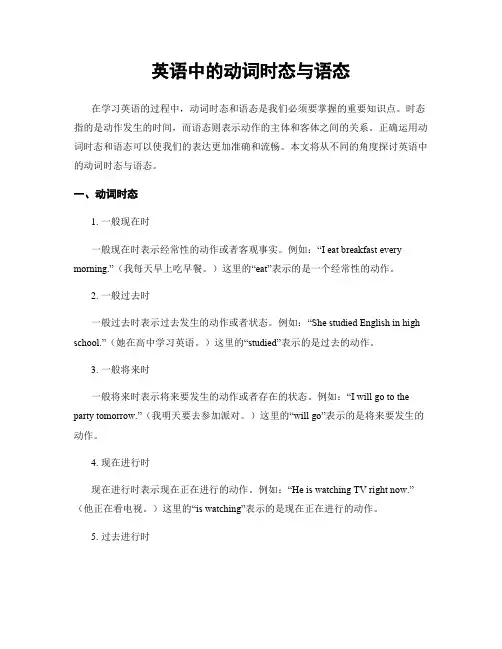
英语中的动词时态与语态在学习英语的过程中,动词时态和语态是我们必须要掌握的重要知识点。
时态指的是动作发生的时间,而语态则表示动作的主体和客体之间的关系。
正确运用动词时态和语态可以使我们的表达更加准确和流畅。
本文将从不同的角度探讨英语中的动词时态与语态。
一、动词时态1. 一般现在时一般现在时表示经常性的动作或者客观事实。
例如:“I eat breakfast every morning.”(我每天早上吃早餐。
)这里的“eat”表示的是一个经常性的动作。
2. 一般过去时一般过去时表示过去发生的动作或者状态。
例如:“She studied English in high school.”(她在高中学习英语。
)这里的“studied”表示的是过去的动作。
3. 一般将来时一般将来时表示将来要发生的动作或者存在的状态。
例如:“I will go to the party tomorrow.”(我明天要去参加派对。
)这里的“will go”表示的是将来要发生的动作。
4. 现在进行时现在进行时表示现在正在进行的动作。
例如:“He is watching TV right now.”(他正在看电视。
)这里的“is watching”表示的是现在正在进行的动作。
5. 过去进行时过去进行时表示过去某个时间正在进行的动作。
例如:“They were playing soccer when it started raining.”(当下雨开始时,他们正在踢足球。
)这里的“were playing”表示的是过去某个时间正在进行的动作。
6. 现在完成时现在完成时表示过去发生的动作对现在造成的影响。
例如:“I have finished my homework.”(我已经完成了作业。
)这里的“have finished”表示的是过去发生的动作对现在的影响。
7. 过去完成时过去完成时表示过去某个时间之前已经发生的动作。
例如:“She had already left when I arrived.”(当我到达时,她已经离开了。
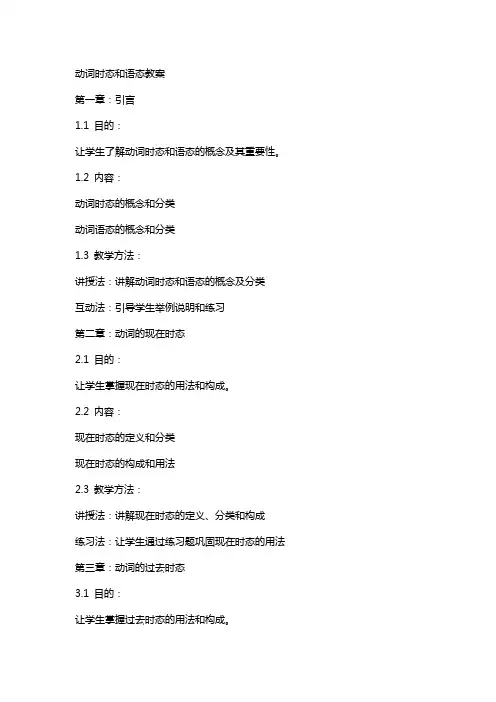
动词时态和语态教案第一章:引言1.1 目的:让学生了解动词时态和语态的概念及其重要性。
1.2 内容:动词时态的概念和分类动词语态的概念和分类1.3 教学方法:讲授法:讲解动词时态和语态的概念及分类互动法:引导学生举例说明和练习第二章:动词的现在时态2.1 目的:让学生掌握现在时态的用法和构成。
2.2 内容:现在时态的定义和分类现在时态的构成和用法2.3 教学方法:讲授法:讲解现在时态的定义、分类和构成练习法:让学生通过练习题巩固现在时态的用法第三章:动词的过去时态3.1 目的:让学生掌握过去时态的用法和构成。
3.2 内容:过去时态的定义和分类过去时态的构成和用法3.3 教学方法:讲授法:讲解过去时态的定义、分类和构成练习法:让学生通过练习题巩固过去时态的用法第四章:动词的将来时态4.1 目的:让学生掌握将来时态的用法和构成。
4.2 内容:将来时态的定义和分类将来时态的构成和用法4.3 教学方法:讲授法:讲解将来时态的定义、分类和构成练习法:让学生通过练习题巩固将来时态的用法第五章:动词的被动语态5.1 目的:让学生掌握被动语态的用法和构成。
5.2 内容:被动语态的定义和分类被动语态的构成和用法5.3 教学方法:讲授法:讲解被动语态的定义、分类和构成练习法:让学生通过练习题巩固被动语态的用法第六章:动词的进行时态6.1 目的:让学生掌握进行时态的用法和构成。
6.2 内容:进行时态的定义和分类进行时态的构成和用法6.3 教学方法:讲授法:讲解进行时态的定义、分类和构成练习法:让学生通过练习题巩固进行时态的用法第七章:动词的完成时态7.1 目的:让学生掌握完成时态的用法和构成。
7.2 内容:完成时态的定义和分类完成时态的构成和用法7.3 教学方法:讲授法:讲解完成时态的定义、分类和构成练习法:让学生通过练习题巩固完成时态的用法第八章:动词的完成进行时态8.1 目的:让学生掌握完成进行时态的用法和构成。
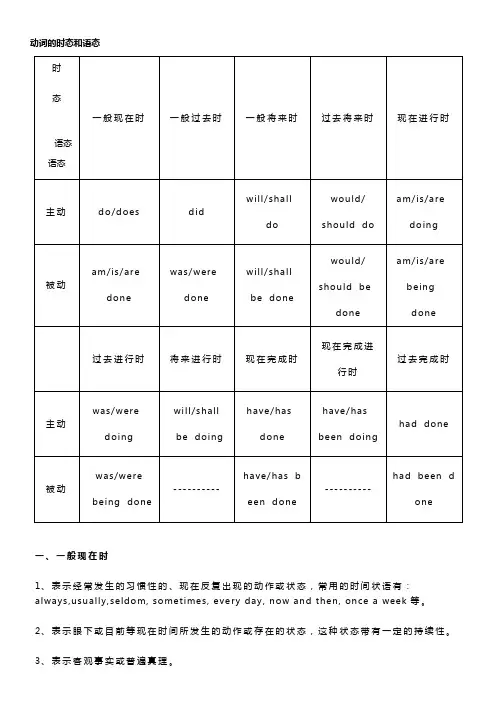
动词的时态和语态一、一般现在时1、表示经常发生的习惯性的、现在反复出现的动作或状态,常用的时间状语有:always,usually,seldom, sometimes, eve ry day, now and then, once a week等。
2、表示眼下或目前等现在时间所发生的动作或存在的状态,这种状态带有一定的持续性。
3、表示客观事实或普遍真理。
4、书报的标题,故事的叙述,小说、戏剧、电影等情节介绍,图片的说明等。
5、时间表、时刻表、日程表、节目单、课程表等按规定将要发生的动作,只限于go, arrive, leave, start, stay, return, begin, come等动词。
6、在时间、条件、方式、让步状语从句中,表示将来的动作。
注意:一般现在时可以用于定语从句或宾语从句中表示将来。
7、用在某些表达中,表示现在正在发生的动作或存在的状态。
Here comes the bus!How it rains!二、一般过去时1、表示在过去某一时间点发生的动作或所处的状态,与现在没有关系。
常用的时间状语有:yesterday, last night, at that time等。
2、表示在过去某一段时间里反复出现的动作或状态,与现在没有关系。
3、用used to do或would do表示过去经常或反复发生的动作。
4、有些情况发生的时间没清楚表明,但实际上是“刚才,刚刚”发生的,属于过去时间,应使用过去时态。
常见的有I didn’t know…或I forgot…等。
5、一般过去时可与today, this week, this month等时间状语连用。
三、一般将来时1、will/shall do(1)表示将来会出现的动作或状态。
常用的时间状语:this evening, tomorrow, next week/month…,at the end of this term, in a few minute s等。
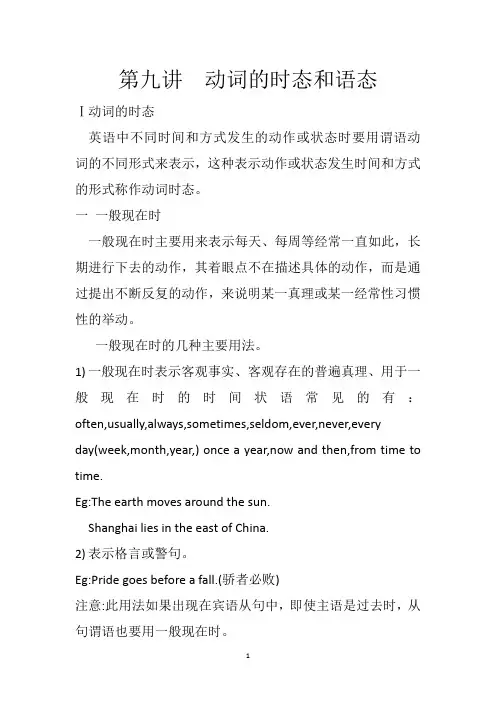
第九讲动词的时态和语态Ⅰ动词的时态英语中不同时间和方式发生的动作或状态时要用谓语动词的不同形式来表示,这种表示动作或状态发生时间和方式的形式称作动词时态。
一一般现在时一般现在时主要用来表示每天、每周等经常一直如此,长期进行下去的动作,其着眼点不在描述具体的动作,而是通过提出不断反复的动作,来说明某一真理或某一经常性习惯性的举动。
一般现在时的几种主要用法。
1)一般现在时表示客观事实、客观存在的普遍真理、用于一般现在时的时间状语常见的有:often,usually,always,sometimes,seldom,ever,never,everyday(week,month,year,) once a year,now and then,from time to time.Eg:The earth moves around the sun.Shanghai lies in the east of China.2)表示格言或警句。
Eg:Pride goes before a fall.(骄者必败)注意:此用法如果出现在宾语从句中,即使主语是过去时,从句谓语也要用一般现在时。
Eg:Columbus proved that the earth is round.3)表示现在习惯的、经常重复的或定期发生的动作或存在的状态。
Eg:I leave home for school at 7 every morning.We go to school every day except on Sunday.4)表示能力、性格、个性等。
Eg:I do not know so much.Ann writes good English but does not speak English well.注意:1)表示“感觉”“状态”或“关系”的动(如:be ,like,love,hate,want,think,remember,find,sound,forget, Refuse,see,allow,prove,have,matter,taste,look,feel)常用一般现在时,不用现在进行时。
动词的时态和语态变化规则动词的时态是用来表示动作或状态发生的时间,而语态则表示动作的主动与被动关系。
下面是动词时态和语态的变化规则:时态变化规则一般现在时一般现在时表示经常性的、普遍性的或真理性的事实。
形式:动词原形例句:他们每天去学校。
现在进行时现在进行时表示正在进行的动作或现阶段的状态。
形式:be动词 + 动词+ing例句:我正在做作业。
现在完成时现在完成时表示过去发生的动作对现在产生的影响。
形式:have/has + 过去分词例句:我已经完成了工作。
简单过去时简单过去时表示过去发生的动作或状态。
形式:动词过去式例句:他昨天去了餐厅。
过去进行时过去进行时表示过去某一时间点正在进行的动作。
形式:was/were + 动词+ing例句:我们昨天这个时候正在看电影。
过去完成时过去完成时表示过去某一时间点之前已经完成的动作。
形式:had + 过去分词例句:她在我到达之前已经到了。
一般将来时一般将来时表示将来发生的动作或状态。
形式:will/shall + 动词原形例句:我明天会打电话给你。
将来进行时将来进行时表示将来某一时间点正在进行的动作。
形式:will be + 动词+ing例句:我明天这个时候将在工作。
将来完成时将来完成时表示将来某一时间点之前已经完成的动作。
形式:will have + 过去分词例句:我们做完任务后,会庆祝一下。
语态变化规则主动语态主动语态表示主语是动作的执行者。
形式:主语 + 动词例句:他们修建了一座桥。
被动语态被动语态表示主语是动作的承受者。
形式:be动词 + 过去分词例句:这座桥被修建了。
以上是动词时态和语态变化的规则。
熟练掌握这些规则对于正确运用英语动词非常重要。
希望以上内容能对你有所帮助。
一.动词的时态和语态动词的时态英语中表示不同时间发生的动作或存在的状态,需用不同的动词形式表示,这种不同的动词形式称为时态(Tense)。
高中阶段我们需掌握十一种时态的用法。
一.一般现在时(1)表示现在经常发生或习惯性的动作或状态,常与usually, always,sometimes, every day, once a week等时间状语连用。
(2)在时间,条件状语从句中表将来的动作。
e.g. The volleyball match will be put off if it rains. (表示将来)如果下雨,排球赛将推迟。
(3)主句中的谓语动词是过去时态,但宾语从句中如果所说的是客观真理,它的谓语动词用一般现在时。
e.g. The teacher told us that the moon goes around the earth.(4)表示安排或计划好的将来动作(只限于少数几个动词:go, come, start, leave等)。
e.g. The summer holidays begin next week. 暑假从下周开始。
School begins the day after tomorrow. 后天开学。
The plane takes off at 2:00 in the afternoon. 飞机下午两点起飞。
(5)在新闻标题,小说和电影以及戏剧情节介绍中常用一般现在时。
e.g. American Ambassador leaves Beijing. 美国大使离京(新闻标题)。
二. 现在进行时(1)表示说话人说话时正在进行的动作,译成汉语“正在”。
这一用法常和表示此刻的时间状语连用,如now, at the moment, at present等。
e.g. It's raining hard now.天正在下大雨。
(2)表示现阶段而并非归眼下(此刻)正在进行着的动作。
动词时态(共14种,常用有9种)一般现在时do一般过去时did一般将来时will do现在进行时be doing现在完成时have/has done过去进行时was/were doing过去将来时would do现在完成进行时have/has been doing被动语态be + done一般现在时的被动语态:be +done一般过去时的被动语态:was/were done一般将来时的被动语态:will be +done过去进行时的被动语态:was/were being done过去将来时的被动语态:would be done1.过去将来时would do come, go, leave, arrive可以用进行表将来is coming = will comewas/were coming = would come2.rise vi 没有被动语态(rose, risen)raisevt.raise your handsHe rose.3.主将从现时间、条件状语从句‘现’= 一般现在时—一般将来= 现在完成时—将来完成If it rains, we won’t goout.Only if you have finished your homework, will you be allowed to play.4.send sb abroad 送某人出国5.leave the door open 让门开着the door be left open6.It will not be long before …没过多久就..It will be long before…过了很久才…7.be harmful todo harm toharm be done to…8.His sister _____ since she left home in 1998.9.Take an umbrella with you if it rains.Take an umbrella with you in case it rains.10.I wrote a letter this morning.I was writing a letter this morning.11.be supposed to = should= ought to 应该12.forbid sb. to do sth. 禁止=forbid doingallow/permit 允许13.sth. run outsb. run out of sth.14.Bob would have helped us yesterday if he hadn’t been busy, but he was busy.15.sentence n. 句子n. 审判v. 审判sentence sb. to death 16.base…on…以…为基础sb. base his sentence on the numberbe based on 基于17.本来打算做某事,但却没有做:had planned, but…intended to have done, but…was/were to have done, but…be supposed to have done, but…would like to have done, but…。
动词的时态和语态在句子中的作用动词是句子的核心,它们不仅表达了动作或状态,还通过时态和语态来表达更多信息,如时间、语气和语义角色等。
在句子中,时态和语态的使用对于准确传达信息以及与语境的契合非常重要。
本文将探讨动词的时态和语态在句子中的不同作用。
一、时态的作用时态是动词形式的一种变化方式,用来表示动作或状态发生的时点或时间段。
时态主要分为一般现在时、一般过去时、一般将来时等。
不同的时态能够准确地将句子中的动作或状态与特定的时间联系起来,从而使读者或听者能够更好地理解句子所表达的含义。
1. 一般现在时:一般现在时常用来表达现在经常发生的动作或无时间限制的客观事实。
例如:“他每天都运动。
”这句话表达了一种习惯或经常发生的动作。
2. 一般过去时:一般过去时用于表示过去发生的动作或状态。
例如:“昨天我去了图书馆。
”这句话说明了在过去某个时间点,发生过我去图书馆的动作。
3. 一般将来时:一般将来时用于表示将来会发生的动作或状态。
例如:“明天我将会去旅行。
”这句话表达了即将发生的动作。
时态的使用使句子更加准确、明确,帮助读者或听者理解动作或状态的发生时间,并与其他信息进行连贯的关联。
二、语态的作用语态表示句子中动作的主体与动作的承受者之间的关系,主要分为主动语态和被动语态。
语态的使用不仅影响句子的表达方式,还能传达不同的语义信息。
1. 主动语态:主动语态中,主语是动作的执行者。
例如:“杰克吃了苹果。
”这句话中,杰克是动作的执行者,主动语态传达出杰克主动地完成了吃苹果的动作。
2. 被动语态:被动语态中,主语是动作的承受者。
例如:“苹果被杰克吃了。
”这句话中,苹果是动作的承受者,被动语态强调的是动作的承受者及其所受到的影响。
语态的使用可以调整句子中的重心,突出动作的执行者或承受者,使句子更清晰、更具信息量。
三、时态和语态的综合运用时态和语态在句子中的使用并不是独立的,经常需要综合运用来传达更为准确的意思。
下面是一些综合运用时态和语态的例子:1. 现在完成时态:现在完成时常用来表达过去发生的动作对现在产生的影响或结果。
动词的时态和语态⒈一般现在时:构成:主语+ 动词原形或第三人称单数形式用法:* 经常性或习惯性的动作,常与usually, always, sometimes, every day, frequently等一起使用。
We raise ducks as a sideline. 我们以养鸭为副业。
I cycle to work every day.我每天骑车去上班。
Mike always takes a job in his holidays.迈克总是在假期找个工作。
It often rains in this area.这个地区经常下雨。
* 现在存在的状态或具有的特征The Arabs are famous for their horses and camels.阿拉伯人以马和骆驼而闻名于世。
China is a great socialist country.中国是一个伟大的社会主义国家。
* 客观规律、正确事实或科学真理、格言以及其他不受时间限制的客观存在Light travels much faster than sound.光比声音传播快得多。
Most matter has three states.大多数物质有三种形态。
* 表示安排或计划要做的动作(句中常有表示未来时间的状语),主要用于begin, come, leave, go, arrive, start, stop, open, close等瞬间动词。
The plane takes off at seven o’clock this evening.飞机定于今晚七点起飞。
He leaves for Paris next Saturday.他将于下周六去巴黎。
* 在时间、条件、方式、让步状语从句中,表示将来的动作常用一般现在时Even if it snows tomorrow, the sports meet will take place. (让步)即使明天下雪,运动会也要举行。
英语常见的动词时态和语态时态是英语中表达时间和动作发生顺序的重要语法要素,而语态则用于表达主语和动作之间的关系。
掌握常见动词时态和语态的用法,对于提高英语语言的准确性和流利性至关重要。
本文将介绍英语中常见的动词时态和语态,包括一般现在时、一般过去时、一般将来时、现在进行时、过去进行时、将来进行时、现在完成时、过去完成时、将来完成时、一般过去将来时、过去完成将来时、被动语态等。
一般现在时(Simple Present Tense)一般现在时表示经常性、习惯性的动作或客观真理,也用于对现状的描述。
一般现在时的构成是主语+动词原形(第三人称单数要加s或es)。
例句:1. I play football every weekend.2. He reads a book every night.3. Water boils at 100 degrees Celsius.一般过去时(Simple Past Tense)一般过去时用于表达过去某个时间发生的动作或状态。
一般过去时的构成是主语+动词过去式。
例句:1. She studied English last night.2. They went to the park yesterday.3. The movie ended two hours ago.一般将来时(Simple Future Tense)一般将来时用于表示将来某个时间将要发生的动作或状态。
一般将来时的构成是主语+will+动词原形。
例句:1. I will travel to Japan next month.2. We will have a meeting tomorrow.3. She will call you later.现在进行时(Present Continuous Tense)现在进行时用于表示现在正在进行的动作。
现在进行时的构成是主语+is/am/are+动词-ing形式。
1 动词的时态和语态 时 态 一般现在时 (1)可表示客观真理、科学事实。 The sun rises in the east and sets in the west. 太阳从东方升起,从西方落下。 (2)可用在由if,unless引导的条件状语从句,由even/if/though引导的让步状语从句,由when,before,until/till,as soon as,the moment引导的时间状语从句,由no matter what/who/when/where/how或whatever,whoever等引导的让步状语从句中,这时主句往往表将来或主句是祈使句。 I’ll go with you as soon as I finish it. 我一做完,就与你一同去。 Whatever you say,I will not change my mind. 无论你说什么,我都不会改变主意。 一般过去时 表示“刚才,在过去”之意,暗示现在已“不再这样”。 —Your phone number again?I didn’t quite catch it. ——再重述一下你的电话号码好吗?我没记下来。 —It’s 9568686. ——是9568686。 一般将来时 (1)“will+动词原形”表示事物的固有属性与必然趋势。 Fish will die without water.离开水,鱼就会死。 (2)“be going to+动词原形”可表示根据迹象对未来进行推断。 Look at the dark clouds.It is going to rain. 看那乌云,要下雨了。 (3)“be about to+动词原形”表示立即的将来,很少与时间状语连用。 The train is about to start.火车就要开了。 (4)位移动词如come,go,arrive等,其一般现在时表按时间表将要发生的事,现在进行时可表计划、安排要做的事。 2
I arrive in Beijing at 3∶00 p.m.tomorrow. 明天下午三点我会到达北京。 He is coming.他将要来。 They are leaving for Tibet.他们将要去西藏。 (5)be to +动词原形 ①表示计划,安排。 When are you to leave for New York? 你计划什么时候去纽约? ②表示指令,相当于should。 You are to report it to the police. 你应该把这事报告给警察。 ③表示“打算,想要”。 If we are to be there before ten,we’ll have to go now. 若我们想在十点前到,我们现在就得走。 现在/过去进行时 (1)表示现在或当时发展中的或正在进行的情况。 I first met Lisa three years ago,she was working at a shop then. 我第一次遇见莉莎是在3年前,那时她正在一家商店工作。 —Hey,look where you are going! ——嘿,看看你往哪儿走! —Oh,I’m terribly sorry.I wasn’t noticing. ——噢!非常抱歉!我没注意。 (2)表示反复出现的或习惯性动作,往往含有赞赏、厌恶、遗憾等情感,常与always,continually,constantly连用。 He is always thinking of others first.(表赞赏) 他总是先为别人着想。 He is always making the same mistake. (表厌烦) 他总是犯同样的错误。 (3)表示动作的未完性、暂时性。 I don’t really work here;I am just helping out until the new secretary arrives.我不是在此工作, 3
我只是在帮忙,新秘书来了我就走。 (暂时性) Selecting a mobile phone for personal use is no easy task because technology is changing so rapidly.选手机供个人使用不是一件容易事因为技术变化太快。 (“变化”尚未完成) (4)表示按计划、安排要做的事。 I’ve won a holiday for two days to Florida.I am taking my mum. 我获得了一次去佛罗里达度两天假的机会。我计划带着我妈妈去。 (计划) (5)表示现在或当时发展中的或正在进行的情况。 —Is this raincoat yours?——这是你的雨衣吗? —No,mine is hanging there behind the door. ——不是,我的在门后挂着呢。 现在完成时 (1)在条件、时间、让步状语从句中,表示将来某时以前已完成的动作。 I will not believe you unless I have seen it with my own eyes. 除非我亲眼看到,我是不会相信你的。 Please don’t get off the bus until it has stopped. 车未停,请不要下车。 (2)It/This is/will be the first(last,second,third...)time that...和It/This is the best(worst,most interesting)+n.+that...结构的从句要求用现在完成时。 This is the first time that I’ve heard her sing. 这是我第一次听她唱歌。 It’s the best film I’ve ever seen. 这是我所看过的最好的一部电影。 过去完成时 (1)Hardly/Scarcely/Barely had...done...when;No sooner had...done...than...中从句用一般过去时。 Hardly had I got home when the rain poured down. 我刚到家,天就下起了倾盆大雨。 No sooner had we started than the car got a flat tyre. 我们刚出发,轮胎就爆了。 (2)表示愿望、打算类的词,如hope,expect,mean,intend,want,think等,用过去完成时 4
表示过去未曾实现的愿望或意图。 I had meant to help you,but I was too busy at the moment. 我本打算帮助你,但当时我太忙了。 现在完成进行时 (1)表示一个从过去某时开始发生,一直延续到现在并可能延续下去的动作。 I’ve been waiting for an hour but she still hasn’t come. 我已等了一个小时,但她还没有来。 (2)表示动作刚刚结束 (有时指出结果)。 My clothes are wet.I’ve been walking in the rain. 我的衣服湿了,我一直走在雨中。 (3)表示重复 (指断断续续,而非一直不停)。 She has been phoning Jim every night for the past two weeks. 两个星期以来她每天晚上都给吉姆打电话。 语 态 被动语态使用要点 不及物动词不能用于被动语态 如appear,rise,die,happen,belong to,break out,take place等。 Great changes have been taken place in my hometown.(误) Great changes have taken place in my hometown. (正) 我们家乡发生了巨大的变化。 表示状态的动词不用于被动语态 如lack,fit,mean,hold,have,cost,contain,become,last,possess,consist of,look like等。 The book costs 10 yuan.这本书花了10元钱。 What’s become of her?她怎么了? 主动形式表被动的几种情况 (1)某些感官动词和系动词后加形容词可以表示被动意义,如look,smell,taste,feel,prove,wear,sound等。 The flower smells sweet.花闻起来很香。 The dish tastes delicious.菜吃起来非常可口。 5
(2)在主语是物的句子里,有些动词的主动形式可以表示被动意义,这些词后常有副词修饰。常用的这类动词有 sell,read,write,wear,wash,open,clean,cook,keep,cut,fill,blow,measure,lock,run,record,begin,shut等。 This type of recorder sells well. 这种型号的录音机销路很好。 He doesn’t photograph well.他不太上相。 This kind of shirt cleans easily.这种衬衫容易洗干净。 (3)动名词主动形式表示被动意义 通常是事物 (也可以是人)作want,need, require,deserve等动词的主语时,表示事物 (或人)客观上“需要……”,用动名词一般式的主动形式作宾语表示被动意义。若动名词是不及物的,后面还应有相应的介词。 The children need looking after.孩子们需要照看。 这种用法还可把动名词改为动词不定式的被动形式来表被动。 The children need to be looked after. (4)在作表语的某些形容词 (easy,difficult,light,heavy,fit,good,safe,comfortable,dangerous,pleasant等)后作状语用的不定式用主动形式表示被动意义。 She is easy to approach.她平易近人。 The rock is hard to break.这块岩石很难打碎。 不定式符号to在被动语态中不可省略 在主动语态中,如果感官动词和使役动词后的宾语补足语是动词,这个动词前往往不用to,但在被动语态中要带to。 I saw her pass by the window.我看见她从窗边经过。 She was seen to pass by the window.她被看见从窗边经过。 get (got)+过去分词也可构成被动语态 get常同marry,beat,break,damage,tear,strike,hurt,paint,invite,repair,dress等动词的过去分词连用,构成被动语态。 John and Jane got married last month. 上个月,约翰和简结婚了。 They got caught in the storm.他们碰上暴风雨了。